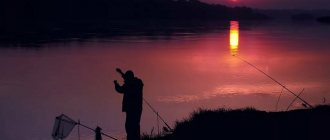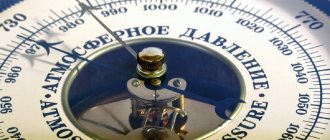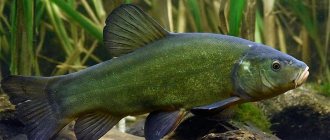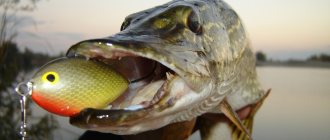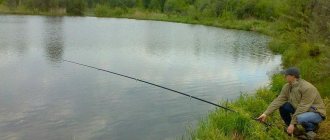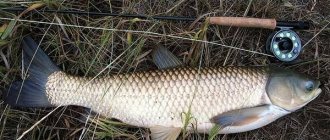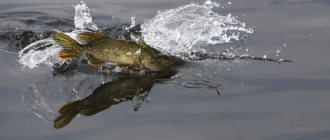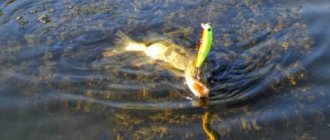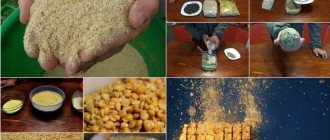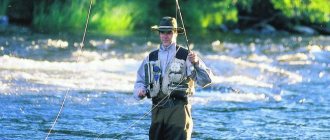Despite the fact that the influence of the phases of the Moon on fish biting is not perceived by everyone as an important factor, such as pressure or wind, it should not be underestimated.
It is a generally accepted fact that all living organisms, including humans, are influenced by environmental conditions.
Lunar cycle
The Moon is a satellite that orbits the Earth. It affects gravity and magnetic fields. The full cycle during which the moon circles the Earth is 29.5 days and is called a lunar month. In turn, the lunar month is divided into eight phases.
1, new moon - a state when the Moon is not visible; 2, new moon ; 3, first quarter ; 4, waxing moon ; 5, full moon - a state when the entire Moon is illuminated; 6, waning moon ; 7, last quarter ; 8, old moon
Theories of the influence of the Moon on fish
Various fishermen and scientists studied the influence of the Moon on aquatic inhabitants. The most famous of them are John Alden Knight and ichthyologist G.V. Nikolsky.
“Solunar theory” (the name Solunar comes from the Latin roots Sol - sun and Lun - moon), was proposed by the American John Alden Knight back in 1926.
According to his theory, the main factors that greatly influence the fish bite are the Sun, the Moon and the tides associated with their influence. Knight studied more than 200 fishing reports and found that 90% of the fish were caught during the new moon and at night .
Ichthyologist G.V. Nikolsky devoted a lot of time to this issue and was able to prove the theory of the mutual connection between the lunar cycle and the behavior of fish.
He made the following conclusions:
- During high tides a lot of food rises to the surface , causing large areas to be flooded with water. During this period, both peaceful and predatory fish are active.
- The amount of reflected sunlight depends on the weather (cloudiness) and the phase of the moon. The more light, the better the fishing .
Features of fish behavior
- The most delicious and catchy bait is the one that constitutes the food of the fish in the reservoir at a given time.
- On hot summer days, fish are caught better in the second half of the night and in the morning, worse in the evening and poorly in the middle of the day.
- And in spring and autumn (as the water gets colder), fish can be caught during the day, preferably in the evening.
- The places where fish “fat” are quite constant, you need to look for them.
- Transparent water and ice require maximum camouflage from the angler - you can’t knock or make noise while fishing, as the fish can hear well.
- When a car moves on ice, the fish moves far from the line of its movement. Large fish react especially to sounds; they move to the sides and into the depths. Crucian carp and tench burrow into the mud.
Changes in atmospheric pressure disrupt the vital balance of fish. Any weather that is stable for a long time is most favorable for fishing:
- Before any change, there is a short-term improvement in the bite - zhor, after which the feeding sometimes stops.
- The longer the bad weather, the better the bite with the onset of a period of stable, warm weather.
- As the algae grow, the fish live among them during the day, and at night they come to the clean shores, not overgrown with algae, and run aground.
Under which Moon does fish bite better?
Now there are several different versions of the influence of the phases of the moon on fish biting. Let's look at the main ones:
1. According to the first version, it is believed that 90% of catches in a lifetime will occur during the full moon and new moon phases . The idea behind moon phase fishing is that the higher the tide, the more active the fish. The strongest tides occur twice a month: during the new moon and full moon . This version is most relevant for places where the tides are most pronounced, for example on the ocean coasts.
2. The second version says that it is on the days of the new moon and full moon that the lowest fish activity is observed and, accordingly, its bite. An excellent time for fishing is considered to be the days of the new moon, which begin 3 days after the new moon and several days a week before the new moon.
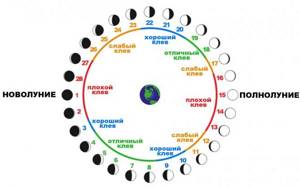
Dependence of moon phases and bite
The figure above shows 28 states of the Moon, despite the fact that the lunar month consists of 29.5 days. The fact is that the new moon and full moon last a little more than 1 day.
3. There is also a statement that fishing should only be done on a full moon at night . The theory here is that the moon's light allows the fish to see better. After all, how nice it is to stand on the shore with a spinning rod on a clear, warm and moonlit night and fish without the help of an annoying flashlight! You can try to catch the predator using surface baits, guiding them along the lunar path. The effect of the splash of an attacking fish is guaranteed to delight!
Average fishing bite
- In winter, the fish bite well immediately after the first ice sets in and at the end of the season, when the flood approaches. At this time of year, choose stable weather with moderate frosts, without wind and snow. You can fish during daylight hours. Each fish has its own comfort levels. Bream and roach bite most actively during prolonged thaws. Pike-perch and perch - in clear frosty weather early in the morning. Burbot prefers to bite on frosty days with snowstorms and winds.
- In spring there is a good bite in clear weather and light wind (or complete calm).
- In summer, the bite occurs in stable, cool weather with light wind. For European Russia, western and southwestern winds are preferred. For the Far East and Eastern Siberia - western, northwestern and northern.
- In autumn, the bite is better on gray, cloudy days with light fog, but without rain.
We suggest you read: Dependence of fish bite on the phase of the moon
Remember, you need to go fishing if:
- clear or partly cloudy sky, light wind, calm and cold night, warming is expected during the day;
- the wind, which began at dawn, intensifies to moderate in the afternoon, subsides in the evening;
- it was clear at night, cumulus clouds gathered by midday, disappearing in the evening;
- In the morning there is fog over the water and in the lowlands, but after sunrise it disappears;
- heavy dew fell at night, disappearing during the day;
- the weather and light levels have been stable for a long time;
- In the summer it rains periodically, which does not change the weather.
As a rule, the bite begins to worsen when the weather begins to change. This needs to be remembered. Unstable weather suppresses fish activity.
- In winter, fish become passive before the frost intensifies (this does not apply to burbot, pike perch, and perch). The beginning of snowfall also causes apathy in them.
- In the spring, fish stop biting when the snow and ice begin to melt. They cannot see in troubled waters.
- In summer, the decline in the bite is associated with water blooms, an increase in its temperature, changes in atmospheric pressure, and drying out of reservoirs. Sometimes when the water level rises, the bite improves, but if the weather remains dry and hot for a long time, it drops again.
- In autumn, fish don’t bite well because it becomes stormy and very windy.
- In summer, poor bite is associated with a sharp change in weather and atmospheric pressure.
- In winter - during drifting snow, heavy snowfalls with temperature fluctuations.
- In spring - with an increase or change in wind direction, a sharp cold snap, and the onset of bad weather. An exception to the rule is burbot, which bites most readily in a snowstorm or heavy rain with thunderstorms.
- In autumn - with the onset of prolonged bad weather.
Remember that you can only waste time fishing if:
- atmospheric pressure drops sharply, the direction of the wind or its strength changes sharply, the wind does not subside, but only intensifies, and most often it comes from the east, south, southeast;
- the temperature in the lowlands and on the hills was the same at night and during the day;
- a light veil of clouds appeared very high, a rare haze formed, cloudiness began to intensify;
- Thick stratus clouds began to form in the middle layers of the atmosphere, and thick dark clouds were already hanging below.
- a weak constant wind is accompanied by a sharp and prolonged drop in pressure;
- the whole sky is covered with clouds, while the wind is strong and gusty, northeast, southeast, east;
- It is raining or snowing for a long time, then stopping, then starting again, and after the rain there is good visibility.
There are naturally many reasons why some carp remain virtually elusive, but to give you just one theory that's as simple as a steamed turnip, not all carp eat the same food. If 99% of fishermen use almost the same bait (for example, boilies), there is always about 5% of fish that will never eat boilies and, accordingly, the chances of catching them by the remaining 1% of fishermen tend to zero.
To put it simply, we don't always use bait that the fish want, and what we offer it isn't perceived as food, so that part of the fish remains elusive to us.
I am 100% confident that natural food sources are the best and most nutritious for carp, and many sparsely populated waters with plenty of natural biomass have proven that carp can grow to very large sizes without ever having tried fishing bait.
On the other hand, overcrowded water bodies, and water bodies poor in biomass, become points at which they cannot support a large population of large individuals and their number is ultimately, and this is naturally, controlled by the number of available food sources. In fact, rivers are often such bodies of water, but even there, a small number of carp may go uncaught as they will use whatever natural food they can find.

It's fair to say that there will always be other reasons that I have yet to discover, but the topic of carp feeding exclusively on natural foods is a very interesting one, and deserves further research.
There are several aspects that need to be mentioned that confound popular theories, but the basic explanation I am going to give is (in my opinion) that it is the work of a genetic factor that causes a large enough population of carp to become elusive.
My attempts to understand this nuance led me to study more, and what I discovered was quite revealing. These elusive carp not only feed differently, on natural food resources, but, due to their habits, they often feed in completely different places in the reservoir, for which there is a completely natural explanation.
The right not to be a schooling fish, or, to put it more accurately, to be a big fish, in perhaps a very small group, requires different behavior and this fact opens up new horizons for us to think about.
Subsistence-fed fish have increased, or more natural, sensitivity and dependence on their sensory devices, and the ability to use electromagnetic fields to find food is vital for any subsistence predator.
Every living organism emits its own electromagnetic signature, and many predators are entirely dependent on the ability to detect this signal. It is also interesting that light-emitting bacteria that live in fresh water are not only bio-luminescent, but in their mass they give a clear electromagnetic signal.
I learned that bacteria have a reproduction time of three days and this fact prompted the next question about their own three-day food theory. How often do you hear, especially in large bodies of water, that it takes carp three days before it comes to feed - but it is quite possible that this carp is wild by nature and is more inclined to natural food?
And it is quite possible that after three days from the moment of casting the bait, the carp, which is very suspicious of the bait, will be attracted by a powerful electromagnetic signal or bio-luminescence emitted by bacteria that were formed as a result of the decomposition of our bait, and not by the bait itself , and only then with weak food signals emitted by any particles of bait. Dare I say this is some good food for thought?
Moon phases: sea and ocean fishing
It's a completely different matter when it comes to sea or ocean fishing. After all, it is the moon that is “to blame” for such phenomena as the ebb and flow of the tides. But she's not the only one. The sun also influences this amazing natural phenomenon. The highest tides, the so-called syzygies, occur during the new moon or full moon, when the position of the Sun, Earth and Moon relative to each other is on the same line, and both celestial bodies act synchronously in relation to our planet. When the Moon is behind the Earth, relative to the Sun, there is a full moon, and when in front, then, accordingly, there is a new moon.
In the first and last quarter of the Moon's phases, when half of its visible part is illuminated, the tides are least pronounced. But it is during this period that the fish bite during high tide is most intense .
Perhaps only because of this, the statement that the bite is weak during the new moon and full moon was automatically transferred to freshwater bodies of water.
In fact, our inland lakes, reservoirs and ponds also experience tidal cycles. But they are microscopically small due to the disparate volume of water.
conclusions
From all of the above, the following conclusions should be drawn:
- In large bodies of water (during sea or ocean fishing), the fish bite increases significantly during high tide . This is explained by the fact that the water floods the shore , where there is a large variety of food and the fish know about it, and accordingly, at this time they tend to the shore.
- In its different cycles, the Moon gives different amounts of light and, accordingly, the illumination of the reservoir changes. And along with the degree of illumination, the behavior of the fish also changes. The light of the Moon allows fish to see better, and therefore to hunt better.
- But you shouldn’t blindly rely only on the Moon; if the weather is inclement, then you need to focus on it first.
And yet, not a single scientist can give an exact answer as to whether the Moon affects fish biting or not. Each fisherman must rely, first of all, on his knowledge, observations, experience, but whether or not he is guided by the fisherman’s calendar, lunar phases and everything else is a personal matter for everyone.
Deterioration in biting
Remember, you can expect a deterioration in the bite if:
- rainy summer, blizzard winter, that is, the weather is constantly changing;
- the strong wind does not subside in the evening, its direction changes all the time, but before the start of a thunderstorm there comes a painful calm;
- after a thunderstorm it gets sharply cold, and at night it becomes warmer, a cloudy front is coming, cumulus clouds form in the west, which cover the sky with a continuous veil;
- at sunset the sun sets in a thick, dark cloud, no evening dew falls, and there is no fog in the morning (in winter, therefore, frost).
